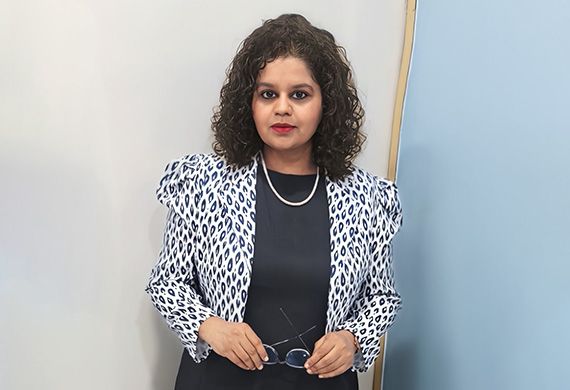
Purpose Meets Growth: Aligning Social Impact & Business Vision
By: Neeta Joshi, Deputy Vice President, Capri Global Capital
Neeta Joshi, a seasoned development professional with over 23 years of experience in CSR and impact management, she drives strategy, compliance, and women-centric initiatives, fostering systemic change through livelihoods, education, health, financial literacy, and community empowerment, benefiting over 800,000 lives.
In a thought-provoking interaction with Women Entrepreneurs Review Magazine, Neeta talks about the fundamentals of women-led CSR leadership and impact creation.
She shares her views on how women leaders can leverage CSR to drive sustainable impact in male-dominated sectors, align women-centric initiatives with business goals, and ensure transparent reporting for long-term trust and social change.
Neeta also shares lessons learnt over the two-decade long journey in the CSR leadership space and the initiatives she has driven at Capri Global.
To understand the nuances of CSR leadership and impact creation, read the following interview.
Drawing from your experience at Capri Global, how do you think can women leaders leverage CSR to create impact within traditionally male-dominated sectors?
Drawing from my experience at Capri Global, I believe women leaders can use CSR as a bridge between corporate strengths and societal needs, particularly in sectors like finance where representation is still evolving. By designing programs that build women’s financial literacy, entrepreneurial skills, and access to credit, we can create pathways for economic independence.
Leveraging CSR funds strategically allows piloting of innovative models that, once successful, can be scaled across regions. Collaboration with industry bodies, microfinance institutions, and technology partners ensures reach and efficiency.
Women leaders bring a unique empathy and inclusivity to program design, ensuring interventions address both practical needs and systemic barriers, making the impact truly sustainable.
You’ve partnered with diverse NGOs across multiple states. What strategies have proven effective in aligning women-centric social initiatives with core business goals and creating impact?
Working with diverse NGOs across states has taught us the importance of deep alignment between a partner’s grassroots expertise and our business vision. The most effective strategies begin with co-creating project goals that reflect community priorities while leveraging our strengths in financial knowledge and operational efficiency. Building capacity within NGOs to track and report outcomes ensures accountability and scalability.
We integrate measurable indicators such as income increase, skill certification, or enterprise survival rates to evaluate impact objectively. By aligning social initiatives with our core finance expertise, like promoting women-led enterprises, we create interventions that are both socially relevant and business-aligned, making them more sustainable over the long term.
How has integrating women empowerment into Capri’s CSR influenced organizational culture and employee engagement, especially encouraging women employees to take leadership roles?
At Capri, integrating women empowerment into our CSR has transformed not just communities but our internal culture. Our women-centric programs supporting entrepreneurs, skilling initiatives, and grassroots leadership have inspired employees, especially women, to engage deeply and step into leadership roles.
By showcasing stories of empowered women through internal platforms, we’ve created aspirational role models that resonate across teams.
Female Colleagues now actively lead CSR initiatives, mentor women in the field, and bring fresh purpose to their roles.
This cultural shift is fostering inclusion, driving employee engagement, and strengthening our belief that empowering women externally must reflect internally. When women lead inside the organization and in the communities, we build a more resilient, empathetic, and future-ready Capri.
In your two decades of CSR leadership, can you share an example of overcoming challenges while implementing women-focused initiatives? What lessons can women leaders apply to their CSR efforts?
During a rural women’s empowerment program, we faced resistance from both communities and the women themselves many had never imagined roles beyond their homes. Drawing from my background in CSR leadership and monitoring & evaluation, we reworked our approach: conducting qualitative assessments, engaging SHGs, and co- creating solutions.
One breakthrough came when a woman-led tailoring unit began supplying school uniforms sparking local belief in what was possible. We didn’t just track incomes we measured shifts in confidence, agency, and mobility.
Lesson for women leaders: Start small, listen deeply, adapt boldly. True impact comes from building trust, tracking both tangible and intangible outcomes, and staying committed.
One empowered woman can transform many but she needs leaders who stand beside her, not above her.
How do you ensure transparent reporting and compliance in women empowerment projects? Why is this rigor critical for gaining trust from stakeholders and driving long-term social change?
In CSR, impact is often measured in numbers—but women empowerment demands a deeper lens. Metrics like confidence, decision-making, and social mobility aren’t always visible upfront, which makes transparency and compliance essential, not optional. My experience leading women-centric programs has taught me that trust is the foundation of long-term change.
We begin with due diligence, establish clear charters, and implement robust monitoring that blends data with human stories. Compliance isn’t a burden—it’s a tool that builds internal discipline and stakeholder credibility. By reporting honestly, acknowledging challenges, and course-correcting with empathy, we gain trust—from communities, boards, and funders. Transparent processes don’t just ensure accountability—they signal that we’re not working for communities, but with them.
LAST WORD: Advice For Women Leaders Looking to Champion CSR-Driven Social Impact
As CSR evolves into a strategic enabler, women leaders bring empathy, insight, and long-term vision to the forefront. With over two decades in CSR and development, I’ve seen how women uniquely balance business goals with genuine community empowerment. My advice: root your strategy in purpose, not just policy. Blend data-driven insights with grassroots realities. Don’t just fund projects—co-create them with communities. Use your influence to build internal CSR champions across teams. And finally, lead with courage and compassion—backed by evidence, not just emotion.
Women in CSR are not just fulfilling mandates; they are shaping legacies, shifting narratives, and building inclusive, sustainable futures—for companies and communities alike.
Most Viewed
- 1 Women's Health Startup HerMD Closing Doors Amid Industry Challenges
- 2 5 Famous Women in Indian Armed Forces
- 3 Saudi Women No longer Require Male Permission for Clothing Choices, says Prince MbS
- 4 Kolkata Medtech Startup Innovodigm Raises Rs 5.5 Crore Seed Funding Led by IAN Group
- 5 Yamunanagar's Kashish Kalra Honoured after Securing 111th Rank in UPSC Civil Services Exam
- 6 Madurai Appoints Its First Woman Corporation Head
- 7 IAS Vijayalakshmi Bidari Appointed as the new Nagpur Divisional Commissioner
- 8 American Entrepreneur Lucy Guo Overtakes T Swift to become Youngest Female Billionaire
- 9 ICC Women's World Cup 2025 Trophy Showcased at Indore's Holkar Stadium
- 10 Aparna Saxena's Beauty Venture AntiNorm Launches in India
- 11 Vidya Nataraj Co-Founded BlueStone Jewellery & Lifestyle files IPO
- 12 5 Women Freedom Fighters of India
- 13 Dr. G Krishnapriya appointed as CEO for Trichy
- 14 M3M & Sirona Partner to Introduce Menstrual Hygiene Vending Machines in 15 Locations
- 15 Punjab Govt launches SHE Cohort 3.0 Supporting Tech-led Women Startups
- 16 Indian origin Lawyer, Sweena Pannu appointed as the US New Superior Court Judge
- 17 The Aurora Tech Award recognizes 4 Indian Women-led Startups
- 18 Kerala's Republic Day parade featured an all-female tableau
- 19 Manisha Kabbur Becomes Karnataka's First Woman International Karate Coach
- 20 Director K. S. Ravikumar's Daughter Maalica Ravikumar Launches Life Coaching Company 'Evergrowth Academy' for Women
- 21 Leezu's Raises Pre-Seed Funding to Accelerate Growth in Sexual Wellness Industry
- 22 Sattu: Super-easy summer drink for PCOS gut healing
- 23 Swathi Nelabhatla creates Sitha App, India's First Women-Exclusive Gig Platform
- 24 7 Timeless Female Kathak Dancers & their Iconic Legacies
- 25 Meet 7 Iconic Women Architects of Modern India & their Most Impactful Work
- 26 This Woman-led Insuretech Startup is Helping Bridge the Education Financing Gap in India
- 27 Women Leaders Share Lessons Learnt from India Women's WC Win
- 28 5 Enterprising Women Founders Powering Singapore's Tech & Innovation Landscape
- 29 4 Women. 4 Stories. One Vision for Smarter, Stronger Healthcare
- 30 Global Gender Gap Narrows to 68.8%, But Full Equality 123 Years Away: WEF Report 2025
- 31 Changemakers: 7 Women Entrepreneurs Taking the Make in India Movement Forward
- 32 Meet Lucy Guo, The Youngest Self-Made Female Billionaire Disrupting Tech
- 33 How Women are Driving India's Festive Online Shopping Surge






